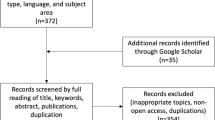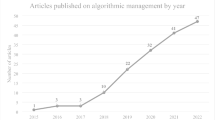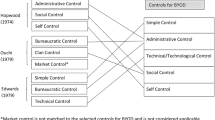Abstract
Algorithmic control is expanding in various domains with the advances in programming algorithms, the continuous increase in hardware computing power, larger amounts of available fine-grained data, and an increasing number of organizations exercising remote work. Scholars and practitioners in human resource management posit that organizations’ adoption of algorithms as a substitute for or supplement to traditional rational control mechanisms to direct, discipline, and evaluate workers might increase the objectivity and transparency of worker-related decision-making processes and, therefore, reduce the power asymmetry and inequality within organizations. This discussion commentary argues that the underlying assumptions of the higher objectivity and transparency of algorithms in organizational control are very strong, and current evidence does not support them. There is also evidence of large variation in organizations’ adoption of algorithmic control due to their current technical, structural, and human capital resources, which further blurs the predicted outcomes. Evidence also exists for an over-reliance on algorithmic suggestions by managers to circumvent accountability. Adopting algorithmic control must therefore be conducted with serious precautions. This article proposes that overestimation of objectivity and transparency, and large variation in organizations’ adoption of AC (including the lack of technical and managerial knowledge of the underlying mechanisms of learning algorithms in some organizations, and the complete abandonment of human intuitive judgment and reasoning in others) could worsen the power asymmetry and inequality within organizations by increasing the opacity of decisions, systematic biases, discriminatory classification, and violation of worker privacy.
Similar content being viewed by others
References
Acker, J. (2006). Inequality regimes: Gender, class, and race in organizations. Gender & Society, 20(4), 441–464. https://doi.org/10.1177/0891243206289499
Ajunwa, I. (2020). The “black box” at work. Big Data and Society, 7(2), 1–6. https://doi.org/10.1177/2053951720938093
Alec Cram, W., & Wiener, M. (2020). Technology-mediated control: Case examples and research directions for the future of organizational control. Communications of the Association for Information Systems, 46, 70–91. https://doi.org/10.17705/1CAIS.04604
Anderson, C., & Brion, S. (2014). Perspectives on power in organizations. Annual Review of Organizational Psychology and Organizational Behavior, 1(1), 67–97. https://doi.org/10.1146/annurev-orgpsych-031413-091259
Anderson, D., Bjarnadóttir, M. V., & Ross, D. G. (2022). Using people analytics to build an equitable workplace. Harward Business Review. https://hbr.org/2022/01/using-people-analytics-to-build-an-equitable-workplace.
Basu, S., Majumdar, B., Mukherjee, K., & Munjal, S. (2022). Human resource management review artificial intelligence–HRM interactions and outcomes: A systematic review and causal configurational explanation. Human Resource Management Review. https://doi.org/10.1016/j.hrmr.2022.100893
Bersin, J., Mariani, J., & Monahan, K. (2016). Will IoT technology bring us the quantified employee? The Internet of Things in human resources. In Deloitte University Press. http://www2.deloitte.com/us/en/pages/tech-nology-media-and-telecommunications/topics/the-internet-of-things.html.
Bhave, D. P., Teo, L. H., & Dalal, R. S. (2020). Privacy at work: A review and a research agenda for a contested terrain. Journal of Management, 46(1), 127–164. https://doi.org/10.1177/0149206319878254
Boudreau, J., & Cascio, W. (2017). Human capital analytics: Why are we not there? Journal of Organizational Effectiveness: People and Performance, 4(2), 119–126. https://doi.org/10.1108/JOEPP-03-2017-0021
Brown, S., Davidovic, J., & Hasan, A. (2021). The algorithm audit: Scoring the algorithms that score us. Big Data and Society. https://doi.org/10.1177/2053951720983865
Burnson, R. (2022). Google agrees to pay $118 million to settle pay equity suit. Bloomberg. https://www.bloomberg.com/news/articles/2022-06-11/google-agrees-to-pay-118-million-to-settle-pay-equity-suit#:~:text=The women leading the Google,University of California at Irvine.
Castilla, E. J., & Benard, S. (2010). The paradox of meritocracy in organizations. Administrative Science Quarterly, 55(4), 543–676. https://doi.org/10.2189/asqu.2010.55.4.543
Cheng, M. M., & Hackett, R. D. (2021). A critical review of algorithms in HRM: Definition, theory, and practice. Human Resource Management Review, 31(1), 100698. https://doi.org/10.1016/j.hrmr.2019.100698
Chornous, G. O., & Gura, V. L. (2020). Integration of information systems for predictive workforce analytics: Models, synergy, security of entrepreneurship. European Journal of Sustainable Development, 9(1), 83. https://doi.org/10.14207/ejsd.2020.v9n1p83
Chowdhury, S., Dey, P., Joel-Edgar, S., Bhattacharya, S., Rodriguez-Espindola, O., Abadie, A., & Truong, L. (2022). Unlocking the value of artificial intelligence in human resource management through AI capability framework. Human Resource Management Review. https://doi.org/10.1016/j.hrmr.2022.100899
Chowdhury, S., Dey, P., Joel-Edgar, S., Bhattacharya, S., Rodriguez-Espindola, O., Abadie, A., Truong, L., Langer, M., König, C. J., Simkute, A., Luger, E., Jones, B., Evans, M., & Jones, R. (2021). Unlocking the value of artificial intelligence in human resource management through AI capability framework. Human Resource Management Review. https://doi.org/10.1016/j.hrmr.2022.100899
Citron, D. K., & Solove, D. J. (2021). Privacy harms. SSRN Electronic Journal. https://doi.org/10.2139/ssrn.3782222
Clegg, S. R., Courpasson, D., & Phillips, N. (2006). Power and organizations. Sage.
Curchod, C., Patriotta, G., Cohen, L., & Neysen, N. (2020). Working for an algorithm: Power asymmetries and agency in online work settings. Administrative Science Quarterly, 65(3), 644–676. https://doi.org/10.1177/0001839219867024
Durán, J. M., & Jongsma, K. R. (2021). Who is afraid of black box algorithms? On the epistemological and ethical basis of trust in medical AI. Journal of Medical Ethics, 47(5), 329–335. https://doi.org/10.1136/medethics-2020-106820
Edwards, L., & Veale, M. (2017). Slave to the algorithm ? Why a ‘right to an explanation’ is probably not the remedy you are looking for, vol. 18. https://doi.org/10.2139/ssrn.2972855.
Edwards, R. (1979). Contested terrain: The transformation of the workplace in the twentieth century. By Richard Edwards. New York: Basic Books, 1979. Pp. ix + 261. $12.95. The Journal of Economic History, 39, 1073–1075. https://doi.org/10.1017/S0022050700099228
Emerson, R. M. (1962). Power-dependence relations. American Sociological Review, 27(1), 31–41. https://doi.org/10.2307/2089716
Engler, A. (2021, August 9). Auditing employment algorithms for discrimination. Brookings. https://www.brookings.edu/research/auditing-employment-algorithms-for-discrimination/.
Faraj, S., Pachidi, S., & Sayegh, K. (2018). Working and organizing in the age of the learning algorithm. Information and Organization, 28(1), 62–70. https://doi.org/10.1016/j.infoandorg.2018.02.005
Gal, U., Jensen, T., & Stein, M.-K. (2020). Breaking the vicious cycle of algorithmic management: A virtue ethics approach to people analytics. Information and Organization, 30, 100301.
Gaur, B., & Riaz, S. (2019). A two-tier solution to converge people analytics into HR practices. In 2019 4th international conference on information systems and computer networks, ISCON 2019, pp. 167–173. https://doi.org/10.1109/ISCON47742.2019.9036312.
Giermindl, L. M., Strich, F., Christ, O., Leicht-Deobald, U., & Redzepi, A. (2021). The dark sides of people analytics: Reviewing the perils for organisations and employees. European Journal of Information Systems. https://doi.org/10.1080/0960085X.2021.1927213
Guinote, A. (2017). How power affects people: Activating, wanting, and goal seeking. Annual Review of Psychology, 68(1), 353–381. https://doi.org/10.1146/annurev-psych-010416-044153
Hamilton, M. (2019). The sexist algorithm. Behavioral Sciences & the Law, 37(2), 145–157.
Jabagi, N., Croteau, A. M., & Audebrand, L. K. (2020). Perceived organizational support in the face of algorithmic management: A conceptual model. In Proceedings of the annual Hawaii international conference on system sciences, 2020-Jan, pp. 4001–4010. https://doi.org/10.24251/hicss.2020.489.
Jarrahi, M. H., Newlands, G., Lee, M. K., Wolf, C. T., Kinder, E., & Sutherland, W. (2021). Algorithmic management in a work context. Big Data and Society. https://doi.org/10.1177/20539517211020332
Kameswaran, V., Ramesh, D., Wang, D., & Sambasivan, N. (2022). How platform-user power relations shape algorithmic accountability: A case study of instant loan platforms and financially stressed users in India. FAccT. https://doi.org/10.1145/3531146.3533237.
Kaori Gurley, L. (2022). Internal documents show Amazon’s Dystopian system for tracking workers every minute of their shifts. VICE. https://www.vice.com/en/article/5dgn73/internal-documents-show-amazons-dystopian-system-for-tracking-workers-every-minute-of-their-shifts.
Kellogg, K. C., Valentine, M. A., & Christin, A. (2020). Algorithms at work: The new contested terrain of control. Academy of Management Annals, 14(1), 366–410. https://doi.org/10.5465/annals.2018.0174
Keltner, D., Gruenfeld, D. H., & Anderson, C. (2003). Power, approach, and inhibition. Psychological Review, 110(2), 265–284. https://doi.org/10.1037/0033-295X.110.2.265
Ken, K. (2022). Leaked: New Amazon worker chat app would ban words like “union”, “restrooms”, “pay raise”, and “plantation.” The Intercept. https://theintercept.com/2022/04/04/amazon-union-living-wage-restrooms-chat-app/.
Köchling, A., & Wehner, M. C. (2020). Discriminated by an algorithm: A systematic review of discrimination and fairness by algorithmic decision-making in the context of HR recruitment and HR development. Business Research, 13(3), 795–848. https://doi.org/10.1007/s40685-020-00134-w
Kroger, J. L., Lutz, O.H.-M., & Ullrich, S. (2021). The myth of individual control: Map** the limitations of privacy self-management. SAGE. https://doi.org/10.1177/ToBeAssigned
Kshetri, N. (2021). Evolving uses of artificial intelligence in human resource management in emerging economies in the global South: Some preliminary evidence. Management Research Review, 44(7), 970–990. https://doi.org/10.1108/MRR-03-2020-0168
Küpper, D. M., Klein, K., & Völckner, F. (2021). Gamifying employer branding: An integrating framework and research propositions for a new HRM approach in the digitized economy. Human Resource Management Review, 31(1), 100686. https://doi.org/10.1016/j.hrmr.2019.04.002
Lepri, B., Oliver, N., Letouzé, E., Pentland, A., & Vinck, P. (2018). Fair, transparent, and accountable algorithmic decision-making processes: The premise, the proposed solutions, and the open challenges. Philosophy and Technology, 31(4), 611–627. https://doi.org/10.1007/s13347-017-0279-x
Möhlmann, M., Zalmanson, L., Henfridsson, O., & Gregory, R. W. (2020). Algorithmic management of work on online labor platforms: When matching meets control. MIS Quarterly.
Moss, E., Anne Watkins, E., Singh, R., Clare Elish, M., & Metcalf, J. (2020). Assembling accountability; Algorithmic impact assessment for public interest.
Newman, D. T., Fast, N. J., & Harmon, D. J. (2020). When eliminating bias isn’t fair: Algorithmic reductionism and procedural justice in human resource decisions. Organizational Behavior and Human Decision Processes, 160(April 2018), 149–167. https://doi.org/10.1016/j.obhdp.2020.03.008
Peeters, R., & Schuilenburg, M. (2018). Machine justice: Governing security through the bureaucracy of algorithms. Information Polity, 23(3), 267–280. https://doi.org/10.3233/IP-180074
Petersen, T., & Saporta, I. (2004). The opportunity structure for discrimination. American Journal of Sociology, 109(4), 852–901. https://doi.org/10.1086/378536
Poehlmann, N., Caramancion, K.M., Tatar, I., Li, Y., Barati, M., Merz, T. (2021). The organizational cybersecurity success factors: an exhaustive literature review. In: Daimi, K., Arabnia, H.R., Deligiannidis, L., Hwang, MS., Tinetti, F.G. (Eds.), Advances in security, networks, and internet of things. Transactions on computational science and computational intelligence. Cham: Springer. https://doi-org.libproxy.albany.edu/10.1007/978-3-030-71017-0_27
Pregenzer, M., Remus, U., & Wiener, M. (2020). When market meets bureaucracy: Toward an integrative framework of technology-mediated control in the gig economy.
Ravid, D. M., Tomczak, D. L., White, J. C., & Behrend, T. S. (2020). EPM 20/20: A review, framework, and research agenda for electronic performance monitoring. Journal of Management, 46(1), 100–126. https://doi.org/10.1177/0149206319869435
Ray, V. (2019). A theory of racialized organizations. American Sociological Review, 84(1), 26–53. https://doi.org/10.1177/0003122418822335
Schafheitle, S. D., Weibel, A., Ebert, I. L., Kasper, G., Schank, C., & Leicht-Deobald, U. (2020). No stone left unturned? Towards a framework for the impact of datafication technologies on organizational control. Academy of Management Discoveries, 6(3), 455–487. https://doi.org/10.5465/amd.2019.0002
Tambe, P., Cappelli, P., & Yakubovich, V. (2019). Artificial intelligence in human resources management: Challenges and a path forward. California Management Review, 61(4), 15–42. https://doi.org/10.1177/0008125619867910
Vrontis, D., Christofi, M., Pereira, V., Tarba, S., Makrides, A., & Trichina, E. (2022). Artificial intelligence, robotics, advanced technologies and human resource management: A systematic review. The International Journal of Human Resource Management, 33(6), 1237–1266. https://doi.org/10.1080/09585192.2020.1871398
Wiener, M., Cram, W., & Benlian, A. (2021). Algorithmic control and gig workers: A legitimacy perspective of Uber drivers. European Journal of Information Systems, 00(00), 1–23. https://doi.org/10.1080/0960085X.2021.1977729
Zuboff, S. (2019). Surveillance capitalism and the challenge of collective action. New Labor Forum, 28(1), 10–29. https://doi.org/10.1177/1095796018819461
Funding
This research did not receive any specific grant from funding agencies in the public, commercial, or not-for-profit sectors.
Author information
Authors and Affiliations
Corresponding author
Ethics declarations
Conflict of interest
The author does not have any conflicting interests to disclose.
Additional information
Publisher's Note
Springer Nature remains neutral with regard to jurisdictional claims in published maps and institutional affiliations.
Rights and permissions
Springer Nature or its licensor holds exclusive rights to this article under a publishing agreement with the author(s) or other rightsholder(s); author self-archiving of the accepted manuscript version of this article is solely governed by the terms of such publishing agreement and applicable law.
About this article
Cite this article
Barati, M., Ansari, B. Effects of algorithmic control on power asymmetry and inequality within organizations. J Manag Control 33, 525–544 (2022). https://doi.org/10.1007/s00187-022-00347-6
Accepted:
Published:
Issue Date:
DOI: https://doi.org/10.1007/s00187-022-00347-6




